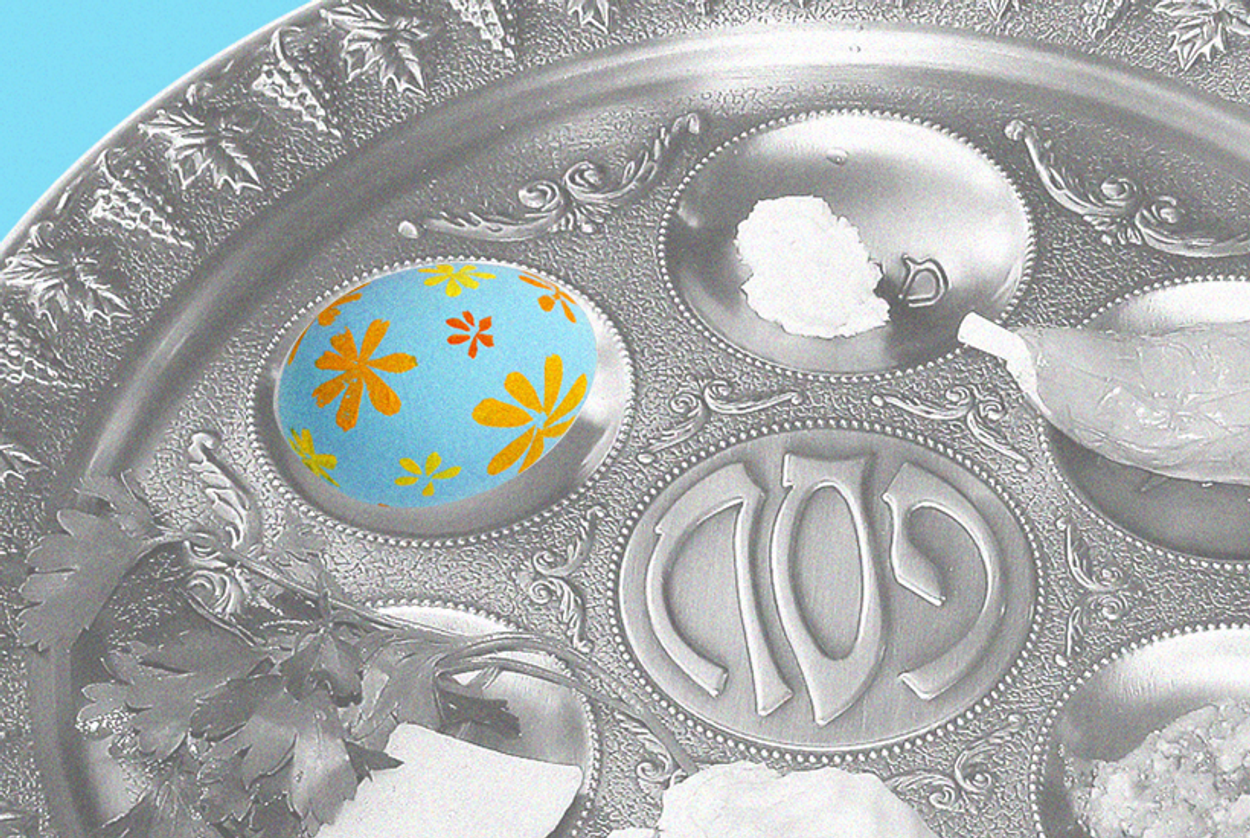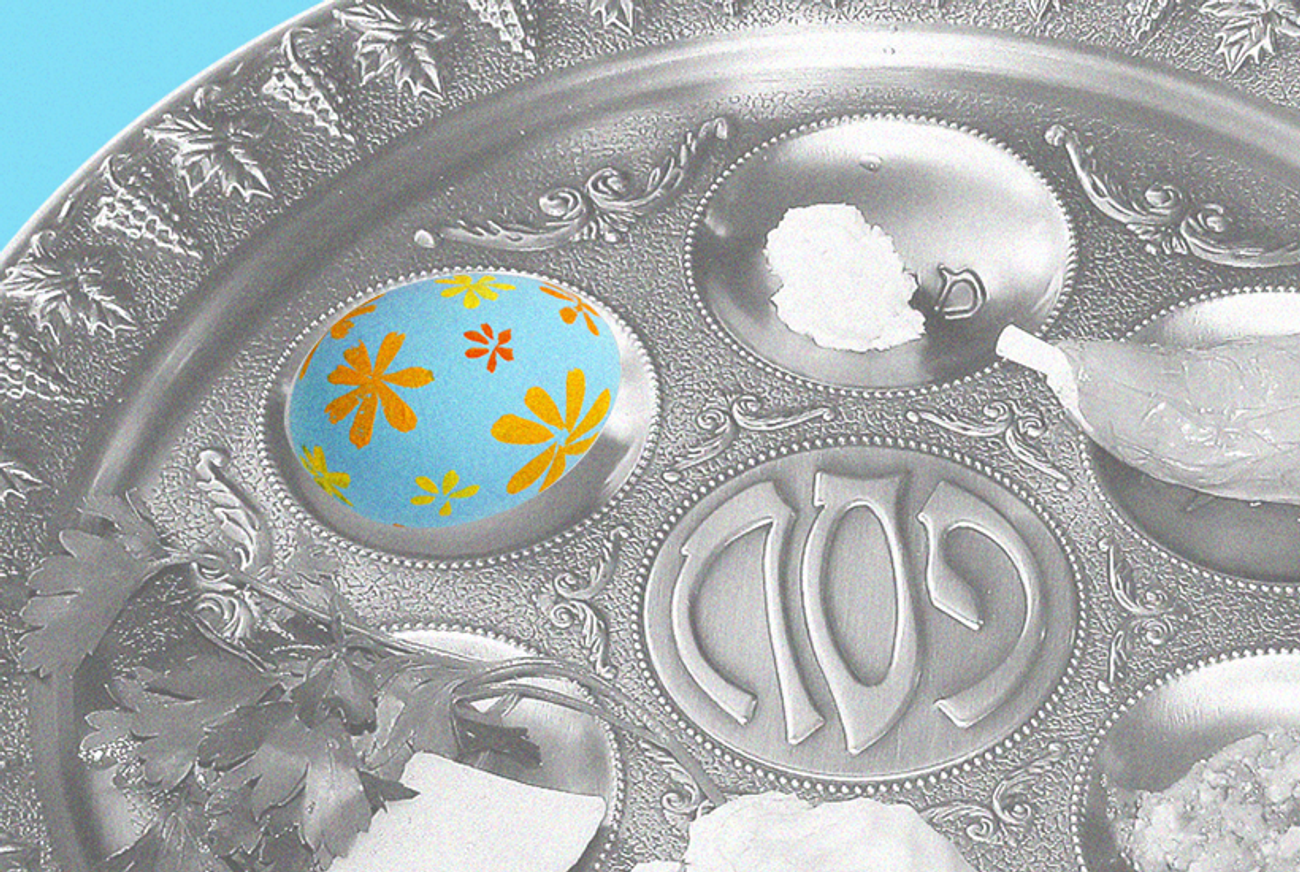The Days of Matzo and Baklava
It’s a busy week for our blended family: Last weekend, our Passover Seder; next weekend, our Greek Easter feast




As I rode the subway to my fiancé’s family Passover Seder last year, I speed-read the Passover section of The Jewish Book of Why. Why Passover? Why matzo? Why the shank bone? Why the bitter herbs? Why the reclining? Why the drops of wine? I knew the answers to some of these questions but it was still an edifying read. Did you know that the Jews adopted the custom of eating in a reclining position from the Greeks and Romans as an expression of their desire to lead a free and untroubled existence? Did you know that wine is spilled from the cup when the Ten Plagues are recited because early societies believed that evil spirits could be bribed with wine? I knew that I’d enjoy imparting these new nuggets of knowledge to my Jewish soon-to-be family-in-law at their Seder.
But as I read in the packed subway car, I was also wondering about other questions: How will people read me reading this? Will they think I’m Jewish? (Probably.) Do I care?
A week later, I took a different subway to Astoria, Queens, to go grocery shopping for my own celebration of Greek Easter. My mother’s family is from Greece—although she, like me, was born and raised in Australia. As I waited in a butcher shop on 30th Avenue that had no semblance of a line and was filled with Greek icons, flags, hanging lamb carcasses, and confusion, I wondered if the other customers would think I was Greek. (Probably not.) I couldn’t push to the front of the queue like all the others who called out to the shop assistants in Greek—with Easter tidings, some wisecrack, or questions about their kids—because I don’t speak the language. Instead, I found myself striking up a conversation with the unfortunate, unassuming person next to me so that I could tell him that I am Greek, that I was “one of them.”
This year, like last year, we are observing both Passover and Greek Easter with my partner’s family. Last weekend we attended Seders in New Jersey and on the Upper West Side; next Sunday his family will come all the way to Brooklyn for Easter Sunday lunch at our apartment. (We are not celebrating with my family as they are on the other side of the world in Australia, feasting on Paschal lamb as they hunker down for some semblance of a winter.) However, this year feels different, as it is the first year of our dual Jewish-Christian holiday observance as husband and wife. At this time of year, when our two cultures almost collide with these two holidays, I am increasingly aware of how much the preparing and eating of food reasserts our inherited religious and cultural identities while also assisting in the creation of new ones.
I have not converted to Judaism, but it is important to my husband that I understand and celebrate his religious and cultural practices, just as it is important to me that he do the same with regard to mine. Celebrating Passover—and Jewish holidays in general—incites in me feelings of transformation, adaptation, and creation as I participate in practices that are new and unfamiliar but are becoming my traditions as well. These are feelings with which my husband also identifies when it comes to Easter and other Christian holidays.
While of course this is an exciting time for both of us, there are still feelings of trepidation. Just as I wondered if I would be mistaken as Jewish on the subway, I wonder how much of my Greekness and Australianness I will lose as I continue to live in New York, close to my husband’s family and very far from my own. There’s also an element of anxiety. When attending synagogue with my husband, I am constantly preparing myself for the unlikely time when I’ll be asked to read something in Hebrew, or I’ll hold the prayer book back to front or commit another faux pas and will therefore be revealed to not really belong, to not be “one of them.”
When it comes to food, however, trepidation and anxiety fly out the window. The sensual, personal, and communal act of eating and of abstaining from certain foods is a practice with which I can more easily connect and begin to identify.
For these eight days of Passover, I join my husband in giving up all chametz. And I quite enjoy it. I don’t mean that I enjoy not eating leavened products; I mean that I enjoy connecting to Jewish religion and culture in this way. I’m curious about what is and isn’t chametz and what makes it so. I find it humorous how difficult it is for my husband to give up bread for such a short period, and his urgent ravenous dashes to buy tortilla chips (during Passover, he identifies more so with his Sephardic half, which permits corn). I’m amazed (if not entirely satisfied) by chametz alternatives: matzo pizza, matzo French toast? And I’m intrigued and delighted by certain Seder staples: Kugel I don’t understand, maybe it’s something you have to grow up with; gefilte fish I like; and charoset I could eat all year round. But most important, the comfort I have in commenting upon Passover foods extends to conversation around the Seder table. And the act of eating certain foods (and not eating certain other foods) with my new Jewish family gives me comfort to question, critique, and absorb my new religious and cultural connections.
And the same is true for my husband and his new connection to Easter. While Jews abstain from certain foods during Passover, Christians abstain from certain foods prior to Easter. This year my husband has joined me in giving up sweets and meat (but not fish) for the 40 days of Lent; depending on the timing and overlap of Passover and Greek Easter each year, this can get a bit tricky, but we manage. We are both very much looking forward to multiple servings of Paschal lamb and baklava this coming Sunday. My in-laws include a fish entrée at Passover Seders and we include a fish entrée at Greek Easter because my in-laws don’t actually like lamb. Some years we eat matzo with our Easter lamb (although, I must admit, I sometimes cheat on this one). Thankfully this year Greek Easter occurs after the eighth day of Passover, so we can all soak up the tasty lamb (or fish) juices with plenty of crusty fluffy risen bread.
When I was a child, Greek Easter wasn’t that big a deal in my family. My father, who is Christian but not Greek, is more religious than my mother, so we would attend multiple Anglican services over Easter, but rarely would we go to Greek church. Sometimes we’d check out the local Epitafio Good Friday street procession; sometimes we’d go to visit my godmother, who has a big fat Greek affair every year with multiple lambs on the spit. But these were not consistently repeated rituals year after year. What is constant in my memories of Greek Easter is sitting around our kitchen table with my mother, father, and brothers making koulouria, Greek Easter cookies. While I would not claim that my mother’s cooking is the best—as perhaps many Greek and Jewish children would—the generous splash of ouzo my mum adds to her koulouria dough makes them by far the best koulouria you will ever taste.
As I have already mentioned, I do not speak Greek. My mother did not speak to my brothers and me in Greek while we were growing up, perhaps because her language was the source of much bullying as she spoke only Greek when she started school in 1950s Australia. Instead, she passes her Greek heritage on to us through food and music. These are sensory and compelling mediums for memory and identity, and it is through eating, cooking, listening to music, and dancing that I perform and maintain a very strong sense of Greek identity. My mother’s famous koulouria dough and the many stories she told me as we rolled hundreds, maybe thousands, of cookies function as the glue between my mother’s family history and my own present Greek identity.
Since moving to the United States this glue has become stronger. In New York I have created the tradition of throwing an annual Greek Easter lunch. It’s probably the most extravagant and expensive meal that I make each year. And it is now a tradition that I share with my husband. The two of us take great pleasure in our newly created rituals—developing the menu, shopping in Astoria, marinating the lamb, dyeing the eggs, sitting around our kitchen table kneading and rolling koulouria. We spend days preparing the meal together with Greek music blaring in the background. And when our family and guests arrive, the ouzo and retsina are always flowing, and we all feast with vigor (even if it is only the two of us who have gone over a month without meat).
This new tradition, and my stricter observance of my Greek and Christian heritage since moving to New York, is a way of connecting with my family back home in Australia. It is also part of establishing myself in my new home and my new Jewish family. Hosting a Greek Easter lunch immediately after my husband’s family Passover Seder is a calculated assertion of my cultural and religious heritage that will continue to be present in our lives together alongside his cultural and religious heritage. And by using the word calculated, I don’t mean to present this as an acrimonious act. By including my husband’s family in our Greek Easter feast, I hope it gives them the same comfort that they have given me to question, critique, and absorb their new religious and cultural connections.
Returning to that moment on the subway last year of wondering whether or not I read as Jewish and how I feel about that: The fact is I am often taken to be Jewish and I’m fine with that. I’m becoming more than fine with that as I become more confident that connecting with my husband’s Jewish heritage does not cancel out my own religious and cultural heritage. On the contrary, connecting with his heritage has further affirmed my own.
Krystalla Pearce is an Australian writer and theater-maker living in Brooklyn.